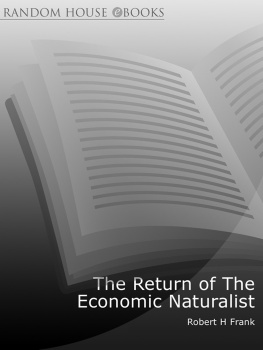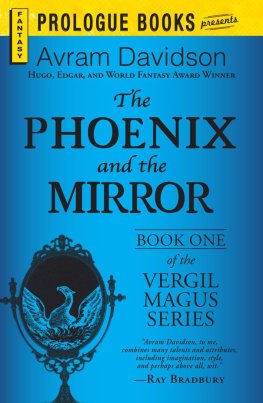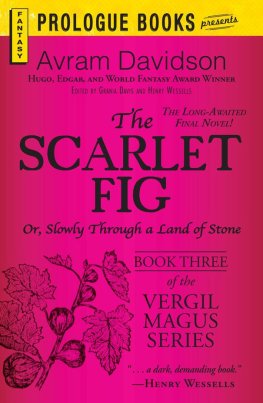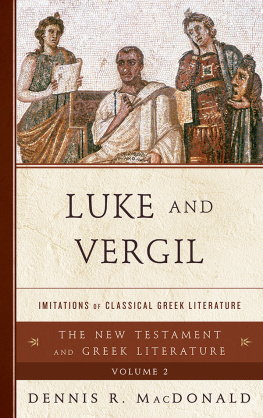Frank - Vergil: a Biography
Here you can read online Frank - Vergil: a Biography full text of the book (entire story) in english for free. Download pdf and epub, get meaning, cover and reviews about this ebook. year: 2012, publisher: Andrews UK Ltd.;Nabu Press, genre: Detective and thriller. Description of the work, (preface) as well as reviews are available. Best literature library LitArk.com created for fans of good reading and offers a wide selection of genres:
Romance novel
Science fiction
Adventure
Detective
Science
History
Home and family
Prose
Art
Politics
Computer
Non-fiction
Religion
Business
Children
Humor
Choose a favorite category and find really read worthwhile books. Enjoy immersion in the world of imagination, feel the emotions of the characters or learn something new for yourself, make an fascinating discovery.

- Book:Vergil: a Biography
- Author:
- Publisher:Andrews UK Ltd.;Nabu Press
- Genre:
- Year:2012
- Rating:5 / 5
- Favourites:Add to favourites
- Your mark:
- 100
- 1
- 2
- 3
- 4
- 5
Vergil: a Biography: summary, description and annotation
We offer to read an annotation, description, summary or preface (depends on what the author of the book "Vergil: a Biography" wrote himself). If you haven't found the necessary information about the book — write in the comments, we will try to find it.
Vergil: a Biography — read online for free the complete book (whole text) full work
Below is the text of the book, divided by pages. System saving the place of the last page read, allows you to conveniently read the book "Vergil: a Biography" online for free, without having to search again every time where you left off. Put a bookmark, and you can go to the page where you finished reading at any time.
Font size:
Interval:
Bookmark:
VERGIL
A Biography
By
TENNEY FRANK
Professor of Latin in the Johns Hopkins University
1922
TO THE MEMORY OF
W. WARDE FOWLER
This edited version, including layout, typography, additions to text, cover artwork and other unique factors is copyright 2012 Andrews UK Limited
This book is sold subject to the condition that it shall not, by way of trade or otherwise, be lent, resold, hired out or otherwise circulated without the publishers prior written consent in any form of binding or cover other than that in which it is published, and without a similar condition being imposed on the subsequent purchaser.
PREFACE
Modern literary criticism has accustomed us to interpret our masterpieces in the light of the author's daily experiences and the conditions of the society in which he lived. The personalities of very few ancient poets, however, can be realized, and this is perhaps the chief reason why their works seem to the average man so cold and remote. Vergil's age, with its terribly intense struggles, lies hidden behind the opaque mists of twenty centuries: by his very theory of art the poet has conscientiously drawn a veil between himself and his reader, and the scraps of information about him given us by the fourth century grammarian, Donatus, are inconsistent, at best unauthenticated, and generally irrelevant.
Indeed criticism has dealt hard with Donatus' life of Vergil. It has shown that the meager Vita is a conglomeration of a few chance facts set into a mass of later conjecture derived from a literal-minded interpretation of the Eclogues, to which there gathered during the credulous and neurotic decades of the second and third centuries an accretion of irresponsible gossip.
However, though we have had to reject many of the statements of Donatus, criticism has procured for us more than a fair compensation from another source. A series of detailed studies of the numerous minor poems attributed to Vergil by ancient authors and mediaeval manuscripts - till recently pronounced unauthentic by modern scholars - has compelled most of us to accept the Appendix Vergiliana at face value. These poems, written in Vergil's formative years before he had adopted the reserved manner of the classical style, are full of personal reminiscences. They reveal many important facts about his daily life, his occupations, his ambitions and his ideals, and best of all they disclose the processes by which the poet during an apprenticeship of ten years developed the mature art of the Georgics and the Aeneid. They have made it possible for us to visualize him with a vividness that is granted us in the case of no other Latin poet.
The reason for attempting a new biography of Vergil at the present time is therefore obvious. This essay, conceived with the purpose of centering attention upon the poet's actual life, has eschewed the larger task of literary criticism and has also avoided the subject of Vergil's literary sources - a theme to which scholars have generally devoted too much acumen. The book is therefore of brief compass, but it has been kept to its single theme in the conviction that the reader who will study Vergil's works as in some measure an outgrowth of the poet's own experiences will find a new meaning in not a few of their lines.
T.F.
I
MANTUA DIVES AVIS
Among biographical commonplaces one frequently finds the generalization that it is the provincial who acquires the perspective requisite for a true estimate of a nation, and that it is the country-boy reared in lonely communion with himself who attains the deepest knowledge of human nature. If there be some degree of truth in this reflection, Publius Vergilius Maro, the farmer's boy from the Mantuan plain, was in so far favored at birth. It is the fifteenth of October, 70 B.C., that the Mantuans still hold in pious memory: in 1930 they will doubtless invite Italy and the devout of all nations to celebrate the twentieth centenary of the poet's birth.
Ancient biographers, little concerned with Mendelian speculation, have not reported from what stock his family sprang. Scientific curiosity and nationalistic egotism have compelled modern biographers to become anthropologists. Vergil has accordingly been referred, by some critic or other, to each of the several peoples that settled the Po Valley in ancient times: the Umbrians, the Etruscans, the Celts, the Latins. The evidence cannot be mustered into a compelling conclusion, but it may be worth while to reject the improbable suppositions.
The name tells little. Vergilius is a good Italic nomen found in all parts of the peninsula,[1] but Latin names came as a matter of course with the gift of citizenship or of the Latin status, and Mantua with the rest of Cisalpine Gaul had received the Latin status nineteen years before Vergil's birth. The cognomen Maro is in origin a magistrate's title used by Etruscans and Umbrians, but cognomina were a recent fashion in the first century B.C. and were selected by parents of the middle classes largely by accident.
[Footnote 1: Braunholz, The Nationality of Vergil, Classical Review, 1915, 104 ff.]
Vergil himself, a good antiquarian, assures us that in the heroic age Mantua was chiefly Etruscan with enclaves of two other peoples (presumably Umbrians and Venetians). In this he is doubtless following a fairly reliable tradition, accepted all the more willingly because of his intimacy with Maecenas, who was of course Etruscan:[2]
Mantua dives avis, sed non genus omnibus unum,
Gens illis triplex, populi sub gente quaterni,
Ipsa caput populis; Tusco de sanguine vires.
[Footnote 2: Aeneid, X, 201-3.]
Pliny seems to have supposed this passage a description of Mantua in Vergil's own day: Mantua Tuscorum trans Padum sola reliqua (III. 130). That could hardly have been Vergil's meaning, however; for the Celts who flooded the Po Valley four centuries before drove all before them except in the Venetian marshes and the Ligurian hills. They could not have left an Etruscan stronghold in the center of their path. Vergil was probably not Etruscan.
The case for a Celtic origin is equally improbable. From the time when the Senones burned Rome in 390 B.C. till Caesar conquered Gaul, the fear of invasions from this dread race never slumbered. During the weary years of the Punic war when Hannibal drew his fresh recruits from the Po Valley, the determination grew ever stronger that the Alps should become Rome's barrier line on the North. Accordingly the pacification of the Transpadane region continued with little intermission until Polybius[3] could say two generations before Vergil's birth that the Gauls had practically been driven out of the Po Valley, and that they then held but a few villages in the foothills of the Alps. If this be true, the open country of Mantua must have had but few survivors. And the few that remained were not often likely to have the privilege of intermarrying with the Roman settlers who filled the vacuum. Romans were too proud of their citizenship to intermarry with peregrini and raise children who must by Roman laws forego the dignities of citizenship.[4]
[Footnote 3: Polybius, II. 35, 4 (written about 140 B.C.).]
[Footnote 4: Ulpian, Dig. V. 8, ex peregrino et cive Romano, peregrinus nascitur.]
A Celtic strain of romance has been from time to time claimed for Vergil's poetry, though those who employ such terms seldom agree in their definition of them. His romanticism may be more easily explained by his early devotion to the Catullan group of poets, and the Celtic traits - whatever they may be - by the close racial affiliations between Celts and Italians, vouched for by anthropologists. But the difficulty of applying the test of the "Celtic temperament" lies in the fact that there are apparently now no true representatives of the Celtic race from whom to establish a criterion. The peoples that have longest preserved dialects of the Celtic languages appear from anthropometric researches to contain a dominant strain of a different race, perhaps that of the pre-Indo-European inhabitants of Western Europe. It may be, therefore, that what Arnoldians now refer to the "Celts" is after all not Celtic. At best it is unsafe to search for racial traits in the work of genius; in this instance it would but betray loose thinking.
Next pageFont size:
Interval:
Bookmark:
Similar books «Vergil: a Biography»
Look at similar books to Vergil: a Biography. We have selected literature similar in name and meaning in the hope of providing readers with more options to find new, interesting, not yet read works.
Discussion, reviews of the book Vergil: a Biography and just readers' own opinions. Leave your comments, write what you think about the work, its meaning or the main characters. Specify what exactly you liked and what you didn't like, and why you think so.












